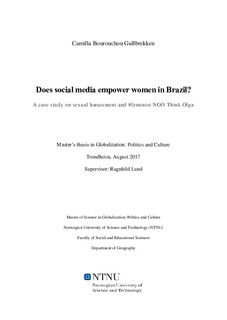| dc.description.abstract | The purpose of this master thesis is to examine if Brazilian women feel empowered by using social media networks. Sexual harassment is a part of Brazilian women’s everyday lives rooted in the machismo society. An online feminist movement against sexual harassment started to spread in 2015 throughout social media to create awareness. There is not much academic production around the topic at this point. It is a new phenomenon which came when the internet access saw a boom as a result of the spread of smartphones in Brazil. This study is based on one case study, the feminist non-governmental organization (NGO), Think Olga. Think Olga uses social media platforms such as Facebook and Twitter to mobilize, protest and criticize sexism in Brazil, and is thus creating new opportunities for women to be more visible and have a voice in the society, which might further lead to empowerment.
Throughout this study, both quantitative and qualitative techniques have been applied through an online questionnaire and a social media analysis. The analytical approach within this study is a four-stage model for political movements using social media; (1) triggering event, (2) online media response, (3) viral organization, (4) physical/ offline response. The issue of sexual harassment is introduced as the triggering event; how the Olgas engage on social media through online media response and contribute to awareness-building; and how this is leading to an online community where collective identities and empowerment are created through Think Olga, a viral organization; and further consider how this issue is important also outside social media – through a physical/ offline response.
Social media has the potential to reach millions of people, which is why these tools are vital in empowering women by providing them a voice in a society that expects them to be silent. Yet, social media cannot alone make a change but it does have significant impact on helping shape debate, influencing and creating awareness. To end sexual harassment in Brazil and to promote women’s rights issues, a change in perception, attitudes, and mentality is required by all actors in the society.
The findings reveal that social media does seem to empower Brazilian women. However, as many of the more marginalized women in the Brazilian society are not present in this study, and considering the low response rate throughout the online questionnaire, no clear conclusion can be made as the participants are not a true representation of the Brazilian population. At this point, it seems like Think Olga is creating empowerment for a group of women in the Brazilian society, which cannot speak for all women in Brazil. Still, what can certainly be concluded is that social media does have the potential to empower Brazilian women. | nb_NO |
